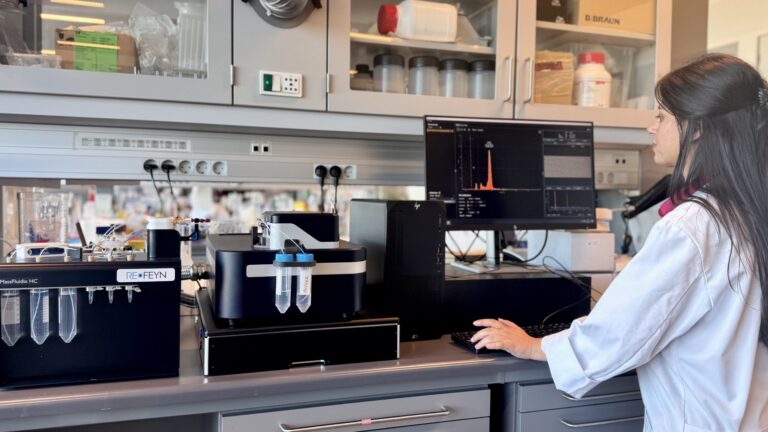
Refeyn’s TwoMP mass photometer and MassFluidix HC system newly installed at the University of Copenhagen in action with Dr. Anni Kumari.
Oxford, UK (07 May, 2025) – Refeyn, the company behind pioneering mass photometry technology, has announced the installation of the 500th system based on its novel single-particle bioanalytical technology – notably, within just seven years of its spin out from Oxford University in 2018. This key milestone is marked as a ‘game changer’ by the Ploug Group at the University of Copenhagen’s Biotech Research & Innovation Centre, where their new TwoMP mass photometer and MassFluidix HC system are now installed to further studies of proteins involved in disease relevant pathways.
The ever-increasing momentum for this unique technology, used in 30+ countries around the world, is also concurrently demonstrated by the scientific community with over 1,000 publications now citing mass photometry. In addition to academic labs like the Ploug Group, mass photometers are used by biopharma companies, CDMOs and CROs – for scientific discovery, drug development and manufacturing.
The Ploug Group is currently using mass photometry to study intravascular lipid metabolism, already citing it in a new research article investigating the regulation of lipoprotein lipase (LPL), a key enzyme for the lipolytic processing of triglyceride-rich lipoproteins in capillaries [1].
“We anticipate that the acquisition of mass photometry in our laboratory is going to be a game changer in our studies on purified proteins involved in intravascular lipolysis,” said Group Leader, Dr. Michael Ploug. “We’ve already shown by mass photometry that the LPL inhibitor ANGPTL3/8 is not an oligomeric complex composed of three ANGPTL3 protomers and one ANGPTL8 protomer as was reported previously, but is actually a trimeric complex composed of only two ANGPTL3 protomers and one ANGPTL8 protomer. This information is self-evidently important for future studies on the regulation of LPL activity in capillaries.”
Mass photometry now provides a valuable orthogonal tool to those already available to the group for its functional and structural protein studies, proving ideal for studying proteins in low concentrations where SEC-MALS is challenged. Dr. Ploug added, “Since our proteins generally operate in the lower nanomolar range, we need to determine their oligomeric states at these low concentrations and we found that our studies using SEC-MALS often lead to misleading conclusions as it requires higher protein concentrations. We also chose the MassFluidix HC as an add-on to the TwoMP, as some of our biophysical analyses do need to be conducted at higher concentrations.”
Dr. Ploug concluded, “Compared to SEC-MALS, mass photometry is fast and provides robust and reliable data. We’re also very much impressed by the software used to control the mass photometer and evaluate the data — it’s very intuitive and easy to operate.”
“Compared to SEC-MALS, mass photometry is fast and provides robust and reliable data.”
– Michael Ploug, University of Copenhagen Biotech Research & Innovation Centre
With 1,000+ scientific citations highlighting the unique bioanalytical workflow capabilities of its mass photometry and macro mass photometry systems, Refeyn’s technology – which enables the label-free characterization of single biomolecules and viral particles in solution in their native state – is proving invaluable for a wide variety of applications. In addition to protein analysis [1], other published application examples include characterization of bispecific antibody byproducts (including aggregates) [2] and lipid nanoparticles (LNPs) [3], direct measurement of mRNA length [4], and also quantification of empty, partially filled and full adeno-associated virus (AAV) vector capsids [5].